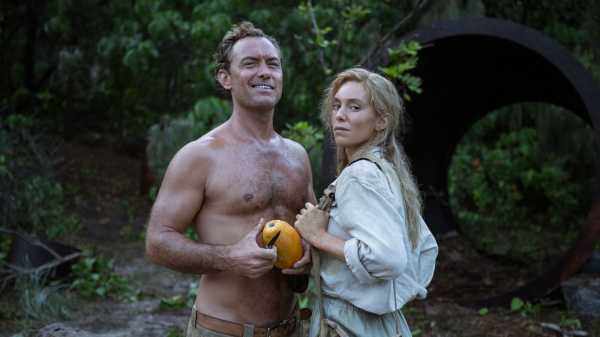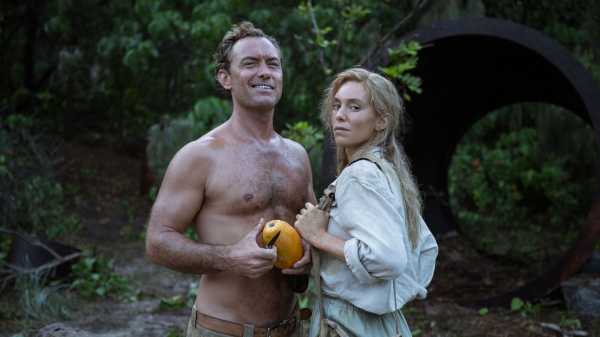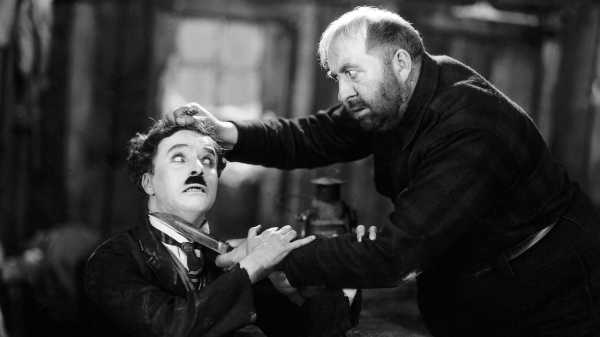
Save this storySave this storySave this storySave this story
The new movie “Eden” features bursts of foul temper, wild sex, grisly violence, and nihilist ideology—a departure, you might say, for Ron Howard, a director whose cinematic disposition can be sunny to the point of sanitization. In a more literal sense, though, the film might be understood as only the latest of his departures to distant places and times. In dramatizing a series of mysterious disappearances that occurred nearly a century ago on an inhospitable island in the Galápagos archipelago, Howard has given us another journey into fact-based, far-flung peril—a picture to file alongside his earlier “Apollo 13” (1995), “In the Heart of the Sea” (2015), and “Thirteen Lives” (2022). Dare we add to the list the much-maligned “Hillbilly Elegy” (2020), which built a different kind of survival story—and cast an unsteady, faintly exoticizing gaze—on the abuses and privations of J. D. Vance’s Rust Belt childhood? “Eden” is a schlocky hoot, but it does offer, if nothing else, a departure from all that. If I were accused of enabling Vance’s political ascent, I might make a beeline for the equator myself.
At least four settlers on the Galápagos island of Floreana vanished or died in the early nineteen-thirties, under circumstances that were contested long afterward among some of the survivors. A 2014 documentary, “The Galápagos Affair: Satan Came to Eden,” gave the subjects’ written accounts a scrupulous airing, letting the settlers tell their stories in their own often conflicting words. “Eden,” which was written by Noah Pink (“Tetris”), begins in 1929, with the Great Depression in the background and drastic life-style reassessments under way. Floreana will soon receive its first human inhabitants in some time, a ruggedly idealistic German couple—Dr. Friedrich Ritter, a physician turned philosopher, and Dore Strauch, his patient turned partner—who have fled the alleged moral and spiritual (to say nothing of financial) bankruptcy of civilized society.
Friedrich and Dore are played by Jude Law and Vanessa Kirby, who, even with dirt-caked, sun-scorched faces, ooze movie-star hauteur. And why not? The First Couple of Floreana may be off the grid, but they are also international celebrities. Friedrich’s letters, which are picked up by boats that occasionally pass through, are eagerly published in European newspapers, and word soon spreads of the life that the couple have built for themselves, complete with a vegetable garden, a prized burro, some chickens, and an innovative shower setup, making the most of the island’s meagre water supply. But, if Friedrich and Dore are committed isolationists, they also have delusions of revolutionary grandeur. Friedrich is writing a manuscript that he hopes will change the course of humanity, though what we hear of it sounds like hackish regurgitations of Nietzsche. The couple also hopes that the island air will prove restorative for Dore, who has multiple sclerosis.
Dore is not the only settler keen to tap into Floreana’s healing powers. In the winter of 1932, another German couple—Heinz Wittmer (Daniel Brühl) and his young wife, Margret (Sydney Sweeney)—arrive on the island with Harry (Jonathan Tittel), Heinz’s teen-age son from a previous marriage, who is recovering from tuberculosis. The Wittmers are adventurous, good-natured, and eager to ingratiate themselves with their hosts. From the start, though, they are treated with barely disguised hostility. Rather than taking the newcomers in, Friedrich leads them to some distant caves and trusts that the miseries of island life—extreme heat, torrential rains, pesky insects, vicious dogs—will soon send them packing. He’s wrong. Heinz and Margret prove smarter and tougher than you’d guess from their Ned Flanders-on-safari demeanor, and vastly preferable to the next batch of island crashers headed their way. Enter a vampy Austrian aristocrat (Ana de Armas, going all in), who calls herself the Baroness Eloise Wehrborn de Wagner-Bosquet—a mouthful of a moniker, and should you doubt the exact pronunciation, I would not trust de Armas’s cheerfully itinerant accent to clear up the matter.
The Baroness has wildly improbable plans to build a luxury hotel on Floreana, and has brought along two hunky manservants—Rudy Lorenz (Felix Kammerer), an engineer, and Robert Phillipson (Toby Wallace), a bodyguard—for detailed consultations on the matter. Most of these are held in a tent, from which loud, ecstatic moans can be heard for seemingly miles around. Not to be outdone, Friedrich has an inscrutably bizarre sex life with Dore, and he nurtures an exhibitionist streak, first greeting the Baroness with what can only be described as naked aggression. Some viewers may experience flashbacks to the young Law in “The Talented Mr. Ripley” (1999), tanning himself on a beach chair like the most golden of golden boys. Striding around in the buff in “Eden,” Law looks older and grubbier, but that faint air of malevolent superiority hasn’t left him; if anything, it seems to have sunk in deep, withered, and putrefied under the hot sun.
There are moments when “Eden” resembles a particularly sour riff on one of Aesop’s fables. The Wittmers are the resourceful, hard-working ants: left to fend for themselves, they eventually have a cottage, a garden, a reservoir, a cow, and, against all odds, a healthy newborn son. (As the decent, uncomplaining young Margret, Sweeney delivers the film’s most credible performance, including a childbirth scene of absurd, awesomely animalistic intensity.) The Baroness is the grasshopper, though she isn’t just lazy but actively predatory; at one point, low on provisions, she orders her manly minions to break into the Wittmers’ cottage and raid their supply of canned goods. As for Friedrich and Dore, they are more like a third kind of arthropod—the lethally poisoned centipede that skitters into an early scene. Dore calls it a “goliath,” a name bestowed by Darwin himself, and warns Margret that “its sting can kill you.” Then, with a purr of satisfaction: “Everything on this island can kill you.”
But who will ultimately be killed, and by what—or whom? That question keeps you watching, even as the film traces an increasingly laborious descent into “Lord of the Flies” terrain. Its title notwithstanding, “Eden” is a drama of paradise despoiled. (The Genesis reference dates back to at least as early as 1931, when one of Ritter’s dispatches was published in The Atlantic under the headline “Adam and Eve in the Galapagos.”) The movie, to my eyes, badly miscalculates the ratio of paradise to despoilment, indulging the latter at the expense of the former. The film’s second half plays out as a protracted series of genre maneuvers, all strategic alliances and unsurprising betrayals, culminating in brutal if rote eruptions of violence: guns and knives come out, and even the livestock is weaponized. We yearn to know far more of what came in the beginning, to see with our own eyes how a bunch of would-be Robinson Crusoes set about taming their terrain. The glimpses we catch are tantalizing—the Wittmers ingeniously constructing a water conduit and marvelling at the sight of their first vegetables—but the rest is largely relegated to expository shorthand. The characters do the work; the movie doesn’t follow suit.
Howard’s own recent filmography suggests a better way. “Thirteen Lives,” inspired by the astonishing 2018 Thai cave rescue, was a patiently rendered and solidly suspenseful process drama in which the mechanics of the operation and the revelations of character intuitively nourished each other. It’s hard not to conclude that, in the case of “Eden,” Howard simply isn’t mean enough for this material. His temperament is better suited to stories of heroic resilience than ones of greed, bloodlust, and cynical isolationism. (His fine documentary “Rebuilding Paradise,” about the fallout from the deadly 2018 Camp Fire, offers still more evidence.) It’s also no surprise that Brühl and Sweeney, as the island’s resident salt-of-the-earth types, come off best, leaving most of the others—save Kirby, a picture of brooding restraint—to marinate in cartoon villainy. Law and de Armas, especially, tend to fall back on exaggerated, sometimes risibly semaphoric gestures, whether it’s Friedrich banging away at his typewriter in a frenzy of inspiration or the Baroness waving around a cigarette holder like Cruella de Vil of the tropics. No island would be big enough for the both of them; Howard’s movie, for no want of effort, proves scarcely more accommodating. ♦
Sourse: newyorker.com







